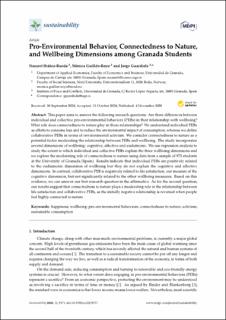| dc.contributor.author | Ibañez-Rueda, Nazaret | |
| dc.contributor.author | Guillen-Royo, Monica | |
| dc.contributor.author | Guardiola, Jorge | |
| dc.date.accessioned | 2021-02-11T14:34:47Z | |
| dc.date.available | 2021-02-11T14:34:47Z | |
| dc.date.created | 2020-11-05T10:33:54Z | |
| dc.date.issued | 2020 | |
| dc.identifier.citation | Ibanez-Rueda, N., Guillen-Royo, M. & Guardiola, J. (2020). Pro-Environmental Behavior, Connectedness to Nature, and Wellbeing Dimensions among Granada Students. Sustainability, 12(21): 9171. doi: | en_US |
| dc.identifier.issn | 2071-1050 | |
| dc.identifier.uri | https://hdl.handle.net/11250/2727494 | |
| dc.description.abstract | This paper aims to answer the following research questions: Are there differences between individual and collective pro-environmental behaviors (PEBs) in their relationship with wellbeing? What role does connectedness to nature play in those relationships? We understand individual PEBs as efforts to consume less and to reduce the environmental impact of consumption, whereas we define collaborative PEBs in terms of environmental activism. We consider connectedness to nature as a potential factor moderating the relationship between PEBs and wellbeing. The study incorporates several dimensions of wellbeing: cognitive, affective and eudaimonic. We use regression analysis to study the extent to which individual and collective PEBs explain the three wellbeing dimensions and we explore the moderating role of connectedness to nature using data from a sample of 973 students at the University of Granada (Spain). Results indicate that individual PEBs are positively related to the eudaimonic dimension of wellbeing but they do not explain the cognitive and affective dimensions. In contrast, collaborative PEB is negatively related to life satisfaction, our measure of the cognitive dimension, but not significantly related to the other wellbeing measures. Based on this evidence, we can answer our first research question in the affirmative. As for the second question, our results suggest that connectedness to nature plays a moderating role in the relationship between life satisfaction and collaborative PEBs, as the initially negative relationship is reversed when people feel highly connected to nature. | en_US |
| dc.language.iso | eng | en_US |
| dc.publisher | MDPI | en_US |
| dc.relation.uri | https://www.mdpi.com/2071-1050/12/21/9171 | |
| dc.rights | Navngivelse 4.0 Internasjonal | * |
| dc.rights.uri | http://creativecommons.org/licenses/by/4.0/deed.no | * |
| dc.title | Pro-Environmental Behavior, Connectedness to Nature, and Wellbeing Dimensions among Granada Students | en_US |
| dc.type | Peer reviewed | en_US |
| dc.type | Journal article | en_US |
| dc.description.version | publishedVersion | en_US |
| dc.rights.holder | © 2020 The Author(s) | en_US |
| dc.subject.nsi | VDP::Samfunnsvitenskap: 200 | en_US |
| dc.source.volume | 12 | en_US |
| dc.source.journal | Sustainability | en_US |
| dc.source.issue | 21 | en_US |
| dc.identifier.doi | 10.3390/su12219171 | |
| dc.identifier.cristin | 1845159 | |
| dc.source.articlenumber | 9171 | en_US |

